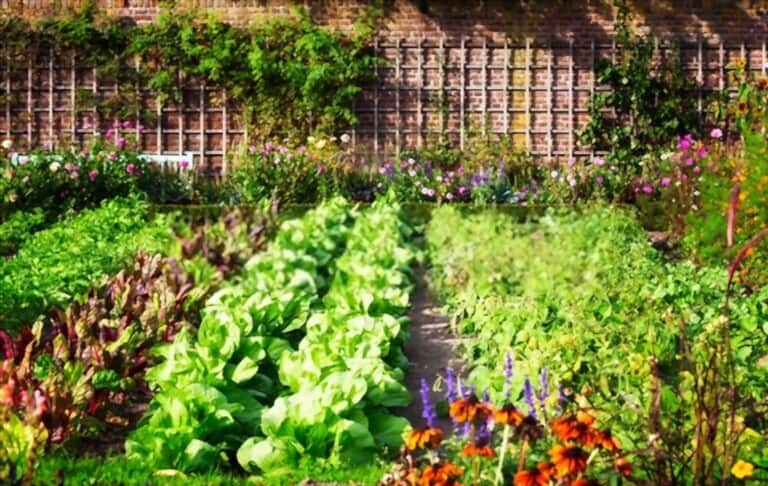For those who like gardening but lack room, kitchen gardening is the ideal substitute. The notion that you can save money by producing your own fruits, veggies, and herbs is common knowledge, but many people are unaware of the profoundly advantageous effects this pastime has on your health. This site is for you if you're interested in growing herbs on your windowsill. Without further ado, let's look at the many advantages of owning a kitchen garden. And here are some benefits of kitchen garden.
Benefits of Kitchen Garden
Fresh herbs are available whenever you desire
The next time you need a few mint or basil leaves, you can just pick them from your plant rather than going out and buying them. Additionally, you won't need to keep purchasing an entire bundle for a few leaves.
It's more affordable
One of the benefits of a kitchen garden is affordability. Plants are inexpensive, and once they are established, all they require is a little water. You'll eventually save a significant amount on your shopping expenditure, especially if you often purchase organic products.

You get some peaceful nature
A relaxing hobby that reduces stress and promotes relaxation is gardening. Numerous studies have demonstrated the benefits of being in nature for both your physical and mental health, as well as for your general well-being.
Satisfaction involved
You might laugh at the concept of becoming emotionally invested in a plant, but once you start taking care of your own, you'll understand what we mean. Every tiny stem, branch, or bloom that appears makes you feel good about yourself.

You are completely in control of the ingredients you use
Nowadays, it might be difficult to determine whether the food is safe to eat due to the widespread use of pesticides on crops. You can be sure that it is secure and chemical-free if you cultivate it yourself.
Much better health results
Having more health results is also one of the benefits of a kitchen garden. You can start eating one or two mint or tulsi leaves every day or putting them in your morning tea if you grow these plants. These herbs provide a wealth of medical advantages, including the treatment of fever, asthma, lung problems, heart illnesses, stress, and respiratory and dental issues.

Mozzie-repellent plants
By properly selecting your herbs, you may prevent those unpleasant bites and lower your chance of contracting dengue or malaria as well as repel mosquitoes. You just need to plant one marigold plant after every two or three herb plants to effectively repel mosquitoes. The vibrant blooms will also make your house more cheerful.
Basics of a kitchen garden: How to get started now
The practice of kitchen gardening is reemerging. These compact, lovely, and fruitful vegetable gardens are experiencing something of a rebirth. Around the world, backyards are starting to sprout them. With the help of an authority on the subject, let's examine the fundamentals of kitchen gardening.

Kitchen gardening – what is it?
Kitchen gardening comes in two varieties. The first method involves growing herbs and vegetables on your windowsill or regrowing vegetables from food scraps in your kitchen. However, the kind of kitchen gardening we're discussing in this post is done outside. Fresh, organic veggies are grown right outside your back door. This kind of kitchen gardening is done for the kitchen rather than in the kitchen.
The practice of kitchen gardening is reemerging. These compact, lovely, and fruitful vegetable gardens are experiencing something of a rebirth. Around the world, backyards are starting to sprout them. You'll be growing in your own kitchen garden like a pro.
What distinguishes "normal" vegetable growing from kitchen gardening?
However, a resurgence in popularity for kitchen gardening is reviving this custom. In general, what distinguishes a kitchen garden from a regular vegetable garden is that it is often smaller, maintained more frequently, and created to have a more visually pleasing connection with the home's design and architecture.
Kitchen gardens are planned areas with symmetrical beds that are arranged and planted in a beautiful way. To put it another way, kitchen gardens are not only useful but also attractive. Additionally, they are designed for eating fresh rather than producing a lot of produce for canning and preserving.
Location ideas for kitchen gardens
You can use existing features of the house to tie the kitchen gardens such as a fence line, the edge of the house, or even by aligning it up with windows or entrances. You really want the kitchen garden to appear like it's been there forever. The easiest way to achieve it is to plan the garden such that it complements the existing lines and structures.
You should put sunshine as your first priority by positioning yourself on the southern side of any large buildings in your environment. Next, make sure you're close to a water supply. Consider your home's aesthetics and how you may extend one or more lines to create a new area that seems like it has always been a part of your home after considering light and water.
To put it another way, don't hurriedly plant a kitchen garden. Consider the area of your property that you would want to spend time in and that has lots of light. You want the garden there, as near to your daily routine as you can get it without being too far away and out of sight.
The practice of kitchen gardening is reemerging. These compact, lovely, and fruitful vegetable gardens are experiencing something of a rebirth. You'll be growing in your own kitchen garden like a pro if you combine the knowledge in this article.
Additionally, raised beds let you grow your plants more densely, maximizing the use of a confined area. Of course, a larger kitchen garden is fantastic as well, but for the majority of families, such a vast area isn't required (or cost-effective!).
Of course, raised beds are not a requirement for kitchen gardens. Technically, a kitchen garden is any area that has been divided into symmetrical beds connected by paths and attractively planted with foodstuffs. A kitchen garden can be in the ground as long as it is consistently tended to and harvested from. But you'll likely have a better time if you have raised beds.
Conclusion
No matter how advanced your house is, nothing beats the satisfaction of living in a green, environmentally conscious home. The fact that you can feed your family with these greens is even more thrilling. Hope that this information will help you clearly know some of the benefits of a kitchen garden.













